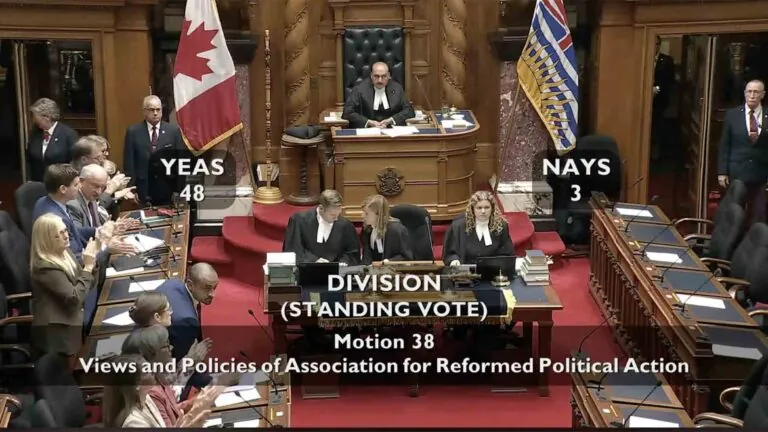On the very first day of the fall legislative session, British Columbia MLAs debated the “views and policies of [the] Association for Reformed Political Action” for almost an hour. The debate was over a motion tabled by the NDP:
“That this House condemns the intolerant views of the Association for Reformed Political Action (ARPA), including its harmful discrimination against transgender people, its belief that homosexuality is ‘immoral’ and its explicit policy goal of restricting abortion access in British Columbia.”
The NDP’s motive for the motion seemed to be to condemn the Conservative opposition for attending ARPA’s MLA reception at the BC legislature back in April. However, the debate never talked about the two issues that ARPA specifically raised at that reception: medical gender transitioning for minors, and euthanasia.
By what standard?
Several NDP, Green, and independent MLAs rose to condemn ARPA’s positions on gender identity, sexual orientation, same-sex marriage, conversion therapy, abortion, IVF, and surrogacy. They argued that ARPA’s views violate various rights and freedoms and run counter to principles of diversity, equity, inclusion, and tolerance.
Now, it goes without saying that ARPA – and all Christians – are in favor of all of these things when viewed in a proper way. In fact, a recognition of rights and the practice of tolerance only really arose in the Christian West.
What this debate exposed is what happens when these things are unmoored from their Christian anchors and made our ultimate political goals. If the expansion of freedom becomes the most important aim of politics, then medical transitioning for minors makes sense. If diversity is the legislature’s most sacred value, then opposition to gay marriage is indeed out of place.
But orthodox Christians know all of these values – rights and freedoms, equity and tolerance – are not the ultimate basis for morality or justice. Rather, the ultimate basis for just laws is God’s revelation to us in His Word and creation. MLAs spent a whole lot of time talking about rights in this hour of debate. But they spent virtually no time talking about what is right. They refused to acknowledge how removing the breasts of a fourteen-year-old girl in the name of “gender-affirming care” is not in her best interest. They refused to consider whether providing euthanasia to the mentally ill might be a step too far even for them. They refused to contemplate whether pre-born children at 35 weeks of age deserve any protections in law.
Calling good evil (Is. 5:20)
Instead, MLAs voted 48-3 to condemn ARPA’s “intolerant” views. (The text of the motion uses “intolerant,” but the word “hateful” was bandied about the most.) Here’s how the vote broke down:
- The entire NDP and Green caucuses, along with independent Elenore Sturko, voted to condemn ARPA.
- The two MLAs from OneBC, and another independent, Jordan Kealy, voted against the motion and spoke up to defend ARPA.
- None of the Conservative MLAs opted to be present for the vote. The lone Conservative speaker to the motion accused the motion of being a “political trap.”
All of this might remind us of the words of Jesus in John 15:18-21:
“If the world hates you, know that it has hated me before it hated you. If you were of the world, the world would love you as its own; but because you are not of the world, but I chose you out of the world, therefore the world hates you. Remember the word that I said to you: ‘A servant is not greater than his master.’ If they persecuted me, they will also persecute you. If they kept my word, they will also keep yours. But all these things they will do to you on account of my name, because they do not know him who sent me.”
If Reformed Christians were of the world – if we supported medical gender transitioning, same-sex marriage, or abortion on demand, or kept silent about them all – these MLAs would not have condemned ARPA. Reformed Christians strive to stand publicly for what God reveals to be true. God says that He created two sexes? That’s how it is. He designed marriage to be between one man and one woman for life? That’s our definition too. God created human life to begin at conception and commands us not to murder? Then abortion is wrong. Recognizing and honoring these truths is good for everyone.
What true love looks like
Our motivation, then, for raising these issues is one of love. Earlier in John 15, Christ says:
“This is my commandment, that you love one another as I have loved you. Greater love has no one than this, that someone lay down his life for his friends. You are my friends if you do what I command you. No longer do I call you servants, for the servant does not know what his master is doing; but I have called you friends, for all that I have heard from my Father I have made known to you. You did not choose Me, but I chose you and appointed you that you should go and bear fruit and that your fruit should abide, so that whatever you ask the Father in my Name, He may give it to you. These things I command you, so that you will love one another.”
And that’s what ARPA and all Reformed Christians should intend to do. We endeavor to love our fellow citizens. This includes not just the fellow brothers and sisters in Christ that Jesus has in mind here, but all people, as Jesus taught in the Parable of the Good Samaritan. We call for a law against abortion because we love pre-born children. We love children who are confused about their gender. We love the same-sex couple next door. And yes, we ought to love the MLAs who voted yesterday to condemn ARPA. For, as John wrote later, “we love because He first loved us” (1 John 4:19).
And so, in this condemnation of ARPA in the BC legislature, as Reformed Christians we might feel “afflicted in every way, but not crushed; perplexed, but not driven to despair; persecuted, but not forsaken; struck down, but not destroyed” (2 Cor. 4:8-9). For we know that “we are more than conquerors through Him who loved us” (Rom. 8:37).
But in light of the fact that few MLAs stood up to defend ARPA – much less defend the bodily integrity of gender dysphoric children or the lives of those threatened by euthanasia or abortion – our provincial representatives need to hear from us. Encourage them not to be afraid to discuss the issues that desperately need our government’s attention, but to boldly hold the government to account.
A version of this article was first posted to ARPACanada.ca












